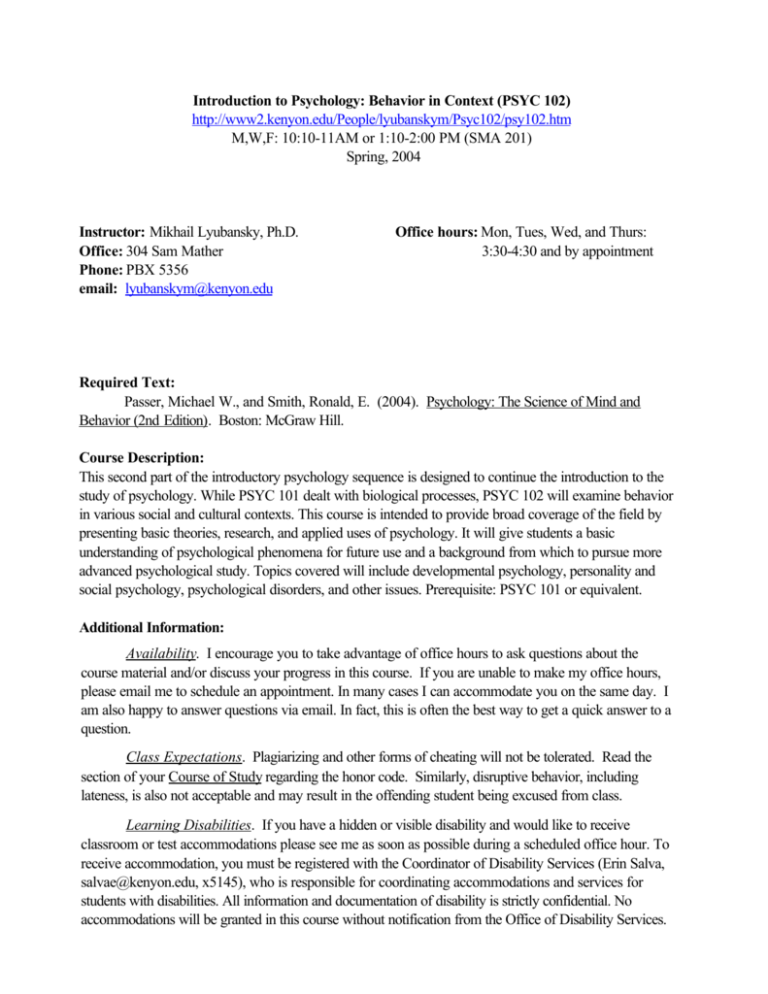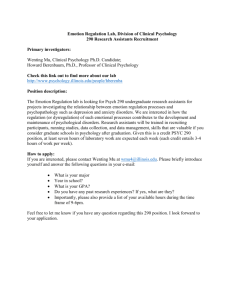Psychology 101: Introduction to Psychology
advertisement

Introduction to Psychology: Behavior in Context (PSYC 102) http://www2.kenyon.edu/People/lyubanskym/Psyc102/psy102.htm M,W,F: 10:10-11AM or 1:10-2:00 PM (SMA 201) Spring, 2004 Instructor: Mikhail Lyubansky, Ph.D. Office: 304 Sam Mather Phone: PBX 5356 email: lyubanskym@kenyon.edu Office hours: Mon, Tues, Wed, and Thurs: 3:30-4:30 and by appointment Required Text: Passer, Michael W., and Smith, Ronald, E. (2004). Psychology: The Science of Mind and Behavior (2nd Edition). Boston: McGraw Hill. Course Description: This second part of the introductory psychology sequence is designed to continue the introduction to the study of psychology. While PSYC 101 dealt with biological processes, PSYC 102 will examine behavior in various social and cultural contexts. This course is intended to provide broad coverage of the field by presenting basic theories, research, and applied uses of psychology. It will give students a basic understanding of psychological phenomena for future use and a background from which to pursue more advanced psychological study. Topics covered will include developmental psychology, personality and social psychology, psychological disorders, and other issues. Prerequisite: PSYC 101 or equivalent. Additional Information: Availability. I encourage you to take advantage of office hours to ask questions about the course material and/or discuss your progress in this course. If you are unable to make my office hours, please email me to schedule an appointment. In many cases I can accommodate you on the same day. I am also happy to answer questions via email. In fact, this is often the best way to get a quick answer to a question. Class Expectations. Plagiarizing and other forms of cheating will not be tolerated. Read the section of your Course of Study regarding the honor code. Similarly, disruptive behavior, including lateness, is also not acceptable and may result in the offending student being excused from class. Learning Disabilities. If you have a hidden or visible disability and would like to receive classroom or test accommodations please see me as soon as possible during a scheduled office hour. To receive accommodation, you must be registered with the Coordinator of Disability Services (Erin Salva, salvae@kenyon.edu, x5145), who is responsible for coordinating accommodations and services for students with disabilities. All information and documentation of disability is strictly confidential. No accommodations will be granted in this course without notification from the Office of Disability Services. Course Requirements: Class participation (0 points). Students are expected to attend class and actively participate (i.e., ask and answer questions). Excessive absence is likely to result in poor test performance, as exams will be based on materials from both lecture and reading. Moreover, there is substantial research indicating that individuals who are exposed to content in multiple ways (e.g., reading and listening to a lecture) retain the material better than students who have only one type of exposure. Internet Project (30 points). You will be required to write a 1-page paper analyzing the scientific literature on a topic you read about on a popular (i.e., non-scientific) internet site. A separate handout with detailed instructions will be distributed in class. Joe Murphy, the library liaison to the psychology department, is available to assist you if you need help with the technical aspects (e.g., how to do an internet search) of the assignment, and, of course, I’m available for any questions regarding content. Research Requirement (20 points). This requirement involves either four hours of participation in psychology experiments conducted by faculty members or students under faculty supervision or a paper which critically reviews a study in psychology. A separate handout providing a detailed explanation of both options will be distributed in the first week of class, and you will be asked to commit to one of the two options in writing by the end of the second week. Examinations (250 points total). There will be three examinations and a final exam. Each exam is worth 50 points and will consist of at least 50 multiple-choice questions (worth 1 point each). Tests are not cumulative by design, though you may need to have knowledge of an earlier topic in order to answer some of the questions. The100-point final examination will cover the last two chapters of the course (at least 40 questions), as well as the main theories and concepts covered throughout the semester (at least 60 questions). All exams must be taken on assigned days. No exceptions will be made without prior arrangements. The final exam will be given during the scheduled final exam period, which is on May 12th at 6:30pm for the 10:10 class on May 12th at 8:30am for the 1:10 class. Unfortunately, the large size of the intro classes does not permit me to schedule any alternative times for the final examinations. Such requests will not be considered, so please make your travel plans accordingly! Grading: The final grade for this course will be based on the total number of points the student earns on class attendance/participation, the 1-page paper, the research requirement, and the final exam. There are 300 total possible points. Grades will be assigned according to the following scale. Exams will be curved, if necessary (i.e., if the average score is under 78%). Grade A AB+ B BC+ C CD+ D DF Total Points 275-300 269-274 263-268 245-262 239-244 233-238 215-232 209-214 203-208 185-202 179-184 below 179 Percentage 92-100% 90-91% 88-89% 82-87% 80-81% 78-79% 72-77% 70-71% 68-69% 62-67% 60-61% below 60% Course Schedule Jan. 19, 21, 23 Introduction: The Science of Psychology Assignment: Chapter 1, Interpret the Psyche myth Jan. 26, 28, 30 Research Methods Assignment: Chapter 2, Solve the Clever Hans dilemma Feb. 2, 4, 6 Development I: Infancy and Childhood Assignment: Chapter 10, pages 373-400 Feb 9, 11, 13 Development II: Adolescence and Adulthood Assignment: Chapter 10, pages 400-417 (and also pages 612-616) Feb 16 (Monday) ** EXAM 1 ** Feb 18, 20 Social Thinking: Attributions and Attitudes Assignment: Chapter 15, pages 590-600 and 617-621 Feb. 23, 25, 27 Social Influence: Norms, Conformity, and Obedience Assignment: Chapter 15, pages 600-612 March 1, 3 Social Relations: Altruism and Aggression Assignment: Chapter 15, pages 621-631 March 5 (Friday) ** EXAM 2 ** March 6-19 SPRING VACATION March 22, 24, 26 Thinking and Intelligence Assignment: Chapter 8, pages 291-324 ** Internet project due March 26th ** March 29, 31, April 2 Motivation and Emotion Assignment: Chapter 9 April 5, 7 Personality Assignment: Chapter 11 April 9 (Friday) ** EXAM 3 ** April 12, 14, 16 Adjusting to Life: Stress, Coping, and Health Assignment: Chapter 12 April 19, 21, 23 Psychological Disorders I: Definitions and Classifications Assignment: Chapter 13, pages 505-512 April 26, 28, 30 Psychological Disorders II: Childhood Dx., Mood Dx, and Schizophrenia Assignment: Chapter 13, pages 512-549 May 3, 5 Psychological Disorders III: Treatment Assignment: Chapter 14 May 7 (Friday) Students’ Choice May 8-10 READING DAYS May 12 ** FINAL EXAMINATION ** (Period 3 at 6:30pm; Period 6 at 8:30am)





